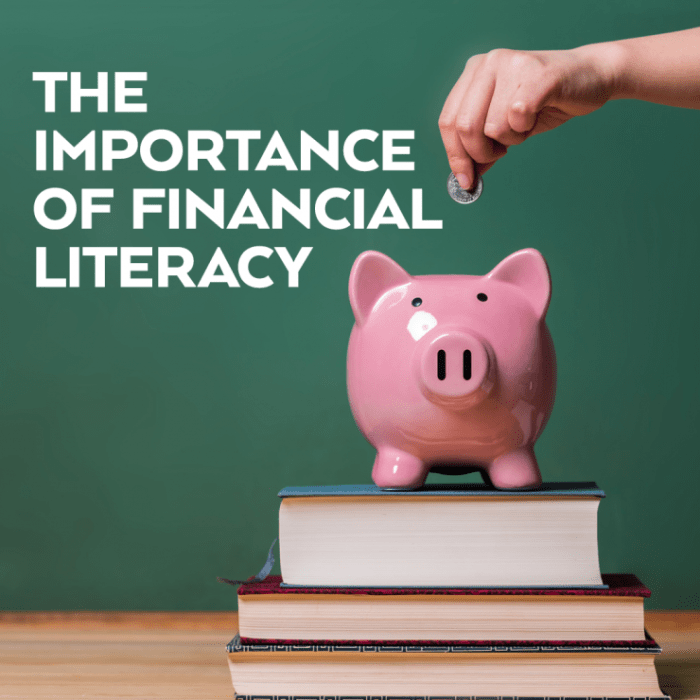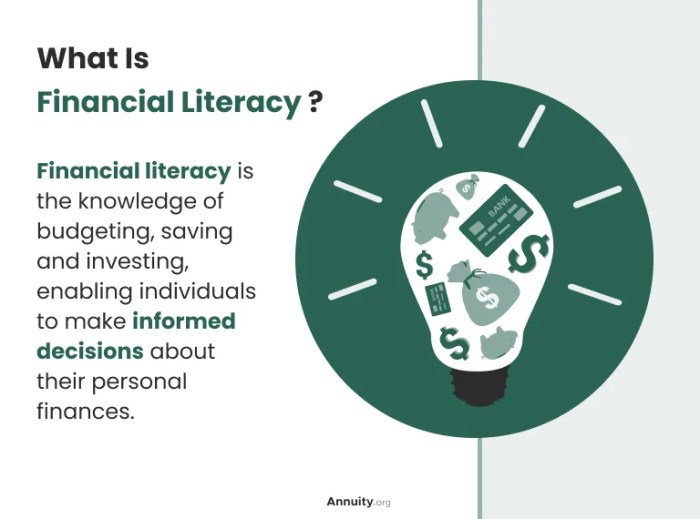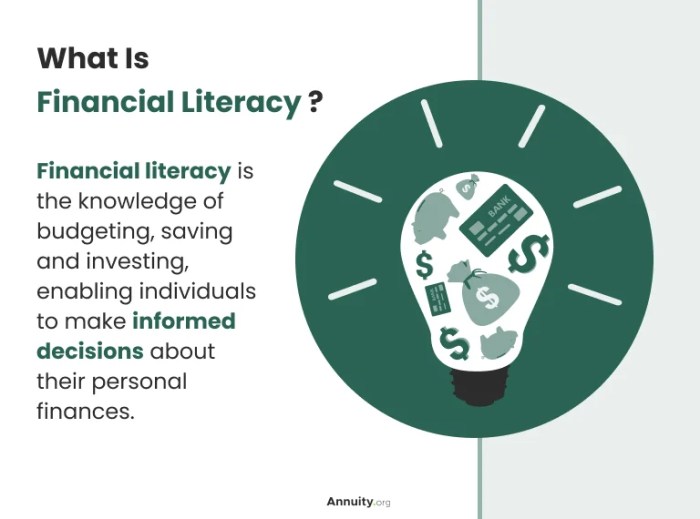What is financial literacy? It’s more than just balancing your checkbook; it’s a fundamental skill that empowers you to make informed decisions about your money, leading to financial stability and a brighter future. In today’s complex financial world, understanding your finances is essential for achieving your goals, whether it’s buying a home, saving for retirement, or simply managing your day-to-day expenses.
Financial literacy encompasses a wide range of concepts, including budgeting, saving, investing, debt management, and understanding credit scores. It’s about acquiring the knowledge and skills to navigate the financial landscape with confidence, making sound choices that align with your personal values and aspirations.
Benefits of Financial Literacy: What Is Financial Literacy
Financial literacy is more than just knowing how to manage your money. It’s about understanding how money works, making informed decisions about your finances, and achieving your financial goals. Being financially literate can have a profound impact on your life, both personally and professionally.
Financial Stability and Security
Financial literacy is crucial for building financial stability and security. By understanding basic financial concepts, you can make informed decisions that can protect your finances and help you weather financial storms.
- Budgeting and Saving:A fundamental aspect of financial literacy is budgeting. By creating and sticking to a budget, you can track your income and expenses, identify areas where you can save, and avoid overspending. This disciplined approach helps you accumulate savings, which can provide a financial cushion for unexpected events like job loss or medical emergencies.
- Debt Management:Understanding the different types of debt, the implications of interest rates, and the importance of responsible borrowing is crucial. Financial literacy empowers you to make informed decisions about taking on debt, managing existing debt, and avoiding excessive borrowing. By managing debt effectively, you can prevent it from spiraling out of control and impacting your financial well-being.
- Investment:Financial literacy enables you to make informed investment decisions. Understanding the different types of investments, their risk profiles, and how to diversify your portfolio can help you grow your wealth over time. Investing wisely can provide a path towards achieving financial goals such as retirement planning or purchasing a home.
Personal and Professional Growth
Financial literacy can also contribute to your personal and professional growth. It provides you with the knowledge and skills to make informed decisions about your finances, which can lead to greater financial freedom, peace of mind, and overall well-being.
- Increased Confidence:Financial literacy empowers you to take control of your finances. By understanding your financial situation and making informed decisions, you gain confidence in your ability to manage your money effectively. This confidence can translate into other areas of your life, boosting your overall self-esteem and resilience.
- Improved Decision-Making:Financial literacy enhances your decision-making skills. You become more discerning about financial products and services, avoiding scams and making choices that align with your financial goals. This ability to make sound financial decisions extends beyond personal finances and can benefit you in your professional life as well.
- Career Advancement:In many professions, financial literacy is a valuable asset. Understanding financial concepts and principles can enhance your job performance, particularly in roles involving financial analysis, budgeting, or investment management. This knowledge can also make you a more attractive candidate for promotions and leadership positions.
Developing Financial Literacy

Financial literacy is a lifelong journey, and there are many ways to enhance your understanding and skills. Whether you are just starting out or looking to refine your knowledge, there are practical steps you can take to become more financially savvy.
The Importance of Education and Resources
Acquiring financial literacy often starts with education. Learning about financial concepts, tools, and strategies can empower individuals to make informed decisions. Here are some ways to access valuable resources:
- Formal Education:Many schools and universities offer courses on personal finance, budgeting, investing, and other related topics. These courses can provide a structured learning experience with expert guidance.
- Online Courses and Programs:Numerous online platforms and organizations offer free or affordable courses on personal finance. These courses can be flexible and convenient, allowing you to learn at your own pace.
- Financial Literacy Websites and Blogs:There are countless websites and blogs dedicated to providing financial advice, tips, and information. These resources can offer insights on a wide range of topics, from budgeting to retirement planning.
- Books and Articles:Reading books and articles on personal finance can be a great way to gain knowledge and perspectives from experienced financial experts.
Practical Tips and Strategies
Beyond education, there are practical steps you can take to enhance your financial literacy:
- Create a Budget:A budget is a roadmap for your finances. It helps you track your income and expenses, identify areas where you can save, and plan for your financial goals.
- Save Regularly:Establishing a savings habit is crucial for financial security. Setting aside a portion of your income regularly, even if it’s a small amount, can help you build a financial cushion for unexpected expenses or future goals.
- Manage Debt Wisely:High-interest debt can be a significant drain on your finances. Prioritize paying down high-interest debt and explore strategies for debt consolidation or management.
- Invest for the Future:Investing your savings can help your money grow over time. Consider different investment options based on your risk tolerance, time horizon, and financial goals.
- Seek Professional Advice:For complex financial matters, such as retirement planning or estate planning, consider consulting a financial advisor. They can provide personalized guidance and help you make informed decisions.
Organizations and Initiatives Promoting Financial Literacy
Numerous organizations and initiatives are dedicated to promoting financial literacy:
- The Financial Literacy and Education Commission (FLEC):This federal commission is responsible for coordinating and promoting financial literacy initiatives across the United States.
- National Endowment for Financial Education (NEFE):NEFE provides resources, programs, and training to help individuals and communities improve their financial well-being.
- JumpStart Coalition for Personal Financial Literacy:JumpStart is a non-profit organization that advocates for financial literacy education for all ages.
- Consumer Financial Protection Bureau (CFPB):The CFPB offers resources and tools to help consumers understand their rights and make informed financial decisions.
Financial Literacy Across Life Stages

Financial literacy is a lifelong journey, with needs and priorities evolving as we navigate different stages of life. From young adulthood to retirement, understanding how to manage money effectively is crucial for achieving financial well-being. This section explores the unique financial literacy considerations for different age groups, highlighting the importance of adapting financial knowledge and skills to specific life stages.
Financial Literacy for Young Adults, What is financial literacy
Young adults often face unique financial challenges as they transition into independence. They may be starting their careers, establishing credit, and making decisions about education and housing. This stage requires a strong foundation in financial literacy to set the stage for long-term financial success.
- Budgeting and Saving:Young adults need to develop budgeting skills to manage their income and expenses effectively. Learning to save regularly, even small amounts, is essential for building an emergency fund and achieving future financial goals.
- Debt Management:Understanding the different types of debt, such as student loans and credit card debt, and developing strategies for responsible borrowing and repayment is crucial.
- Credit Building:Establishing good credit early is essential for accessing affordable loans, mortgages, and other financial products in the future. Young adults should focus on building a positive credit history by paying bills on time and using credit responsibly.
Financial Literacy for Families
As families grow, financial responsibilities expand. Families need to consider expenses related to childcare, education, housing, and other family-related needs. Financial literacy is essential for managing these expenses effectively and planning for the future.
- Family Budgeting:Creating a comprehensive family budget that accounts for all income and expenses is essential for financial stability.
- Saving for College:Planning for college expenses is a major financial consideration for families. Exploring different savings options, such as 529 plans, can help families prepare for the rising cost of education.
- Retirement Planning:Families should start planning for retirement early, even if it seems distant. Contributing to retirement accounts, such as 401(k)s and IRAs, can help ensure financial security in later years.
- Insurance:Understanding the different types of insurance, such as health, life, and disability insurance, is crucial for protecting family members and their financial well-being.
Financial Literacy for Retirees
Retirement brings a new set of financial considerations. Retirees need to manage their savings, ensure they have enough income to cover living expenses, and potentially navigate healthcare costs.
- Retirement Income Planning:Retirees need to carefully plan how they will generate income during retirement. This may involve drawing from savings, pensions, Social Security, or other sources.
- Healthcare Expenses:Healthcare costs can be a significant expense in retirement. Understanding Medicare and other healthcare options is crucial for managing these expenses effectively.
- Estate Planning:Retirees should consider estate planning, including wills, trusts, and power of attorney documents, to ensure their assets are distributed according to their wishes.
Financial Literacy Milestones Across the Lifespan
| Life Stage | Financial Literacy Milestones |
|---|---|
| Young Adulthood (18-25) |
|
| Early Adulthood (26-35) |
|
| Midlife (36-55) |
|
| Retirement (55+) |
|
Financial Literacy and the Future
The world of finance is undergoing a rapid transformation, driven by the rise of technology and the evolving needs of individuals and societies. This shift is reshaping how people manage their finances, access financial services, and make informed financial decisions.
Understanding the evolving landscape of financial literacy in a digital age is crucial for navigating this dynamic future.
The Impact of Technology on Financial Literacy
The digital age has revolutionized financial literacy by providing unprecedented access to information, tools, and resources. The internet has democratized access to financial knowledge, making it easier for individuals to learn about personal finance, investing, and other financial concepts.
- Online Financial Education Platforms:Platforms like Khan Academy, Coursera, and edX offer free or affordable courses on a wide range of financial topics, empowering individuals to learn at their own pace and convenience. These platforms provide a diverse range of learning materials, including videos, articles, quizzes, and interactive exercises, catering to different learning styles and preferences.
- Financial Apps and Tools:Financial technology (FinTech) has developed numerous apps and tools that simplify financial management, budgeting, and investing. These tools, such as Mint, Personal Capital, and Acorns, automate tasks, provide insights into spending habits, and offer personalized financial advice. The accessibility and user-friendly interfaces of these apps have significantly improved financial literacy by making complex financial concepts more approachable.
- Digital Financial Services:The emergence of digital banking, mobile payments, and online lending has expanded access to financial services for individuals previously excluded from traditional banking systems. This increased access to financial services has empowered individuals to participate in the financial system and make informed financial decisions.
Emerging Trends and Challenges in Financial Literacy
While technology has undoubtedly enhanced financial literacy, it also presents new challenges and opportunities.
- Data Privacy and Security:The increasing reliance on digital financial services raises concerns about data privacy and security. Individuals must be aware of potential risks associated with online transactions, data breaches, and identity theft. Financial literacy initiatives need to educate individuals on safeguarding their financial information and adopting safe online practices.
- Financial Literacy for the Digital Age:The rapid evolution of technology requires individuals to adapt and acquire new financial skills. The traditional financial literacy framework may not fully address the complexities of the digital economy, including cryptocurrency, blockchain technology, and artificial intelligence. Educators and policymakers need to develop updated curricula and resources to address these emerging financial concepts.
- Financial Inclusion and Digital Divide:While technology has the potential to bridge the financial literacy gap, it can also exacerbate existing inequalities. Individuals without access to reliable internet, technology, or digital literacy skills may be left behind in the digital financial landscape. Bridging the digital divide and ensuring equitable access to financial resources and education is crucial for promoting inclusive financial literacy.
Closing Summary
By investing in your financial literacy, you’re investing in yourself. You’ll gain the tools and knowledge to make informed financial decisions, build a secure future, and achieve your financial goals. Remember, financial literacy is a lifelong journey, and there are always new things to learn and opportunities to improve.
Embrace this journey, and you’ll be well on your way to a more financially empowered life.
Questions and Answers
How can I improve my financial literacy?
There are many ways to enhance your financial literacy. Start by reading books and articles on personal finance, attending workshops or seminars, and taking online courses. You can also seek guidance from a financial advisor or consult reputable financial websites and resources.
What are some common financial mistakes to avoid?
Common financial mistakes include overspending, neglecting to save, carrying high levels of debt, and not planning for the future. By understanding these pitfalls and taking steps to avoid them, you can make better financial decisions.
Is financial literacy important for young people?
Yes, financial literacy is crucial for young people. Starting early helps them develop good financial habits, avoid debt, and plan for their future financial goals.
